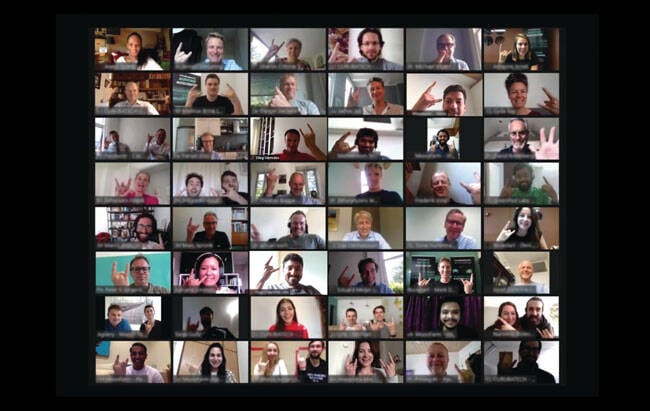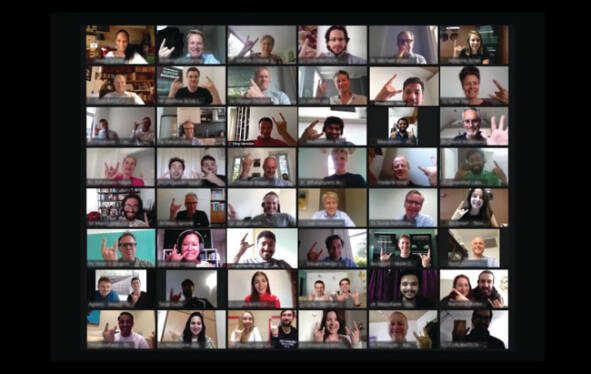What can big(ger) companies in agrifood learn from startups?
“Large corporations can learn how to be agile and adaptable in their approach to experimentation and innovation. That applies to everything, whether it is developing a new product in the lab, scoping a new market opportunity or simply improving the way meetings are run. Bigger companies can also learn a lot from the startup culture. Startups are constantly trying, failing and learning in order to find out what fits, what works and what doesn’t. Having a culture that embraces failure rather than fears it, allows for much faster progress. I would urge big companies to encourage their employees to fail a little, and push the boundaries of what they think is possible to find the true reality of where they can go.”
“In the agrifood space specifically, big corporations could learn to look outside their industry expertise. Many promising agrifood startups are actually started by entrepreneurs who have had little or no prior experience in the sector. This allows them to view the challenges faced by the agrifood industry through a different lens, and opens up for new approaches towards possible solutions.”

Do you think agrifood startups run their companies in a different way than bigger agrifood organisations?
“I think all startups run their businesses in a different way than bigger organisations. Startups are lean by nature; they have to be. Startups are made up of small, determined and passionate teams and they need to be able to move fast and take quick decisions in order to stay alive and (hopefully!) scale exponentially. The co-founders set the culture, and they often bet everything they own on the company. That creates and calls for a very different culture than larger organisations, where the main focus is to protect and maintain steady growth. Bigger organisations simply have more complexity, be it from having to run a larger group of 100s or 1000s of people, or more complex supply chains, or protecting an established brand.”



In what kind of innovations do you see investors mostly invest in the last couple of years?
“Over the last few years, depending which report you read, around two thirds of venture capitalists investment into the agrifood space can be attributed to downstream startups, referring to startups operating at the retailer towards the consumer. Venture capitalist investment in upstream startups, closer to the farmer and before retail, is steady. Within the downstream segment, most of that investment has gone towards startups addressing either online grocery shopping, restaurant marketplaces and alternative proteins. As for the upstream segment, there is a lot of excitement around controlled environment agriculture/vertical farming/indoor farming - these are typically larger rounds but fewer deals, suggesting that the startups in this space are becoming more mature.”
“We see that most venture investment goes towards startups with defensible technology. This is because core technology can create a lot of value for the company. The technology itself doesn’t necessarily need to be high tech, so long as it is defensible or gives the startup an edge against competitors.”
Are there any other trends that you identify for the agrifood sector?
“There are also some mega trends at play, for example the transition to alternative proteins is driving a lot of innovation in the plant-based and cell-based production of protein for human consumption. This space has become very hot, with trail blazers like Beyond Meat, Impossible Foods, Perfect Day, Ynsect, Protix...the list goes on of great companies taking this segment to the next level, and plenty of competitors are joining in.”

What kind of innovations in agrifood do you see as upcoming movements for the coming years?
“We believe that the need for a regenerative and sustainable future food supply system is the core driver for innovation in the agrifood industry. The drive towards more sustainable practices will see technologies that reduce, reuse, recycle and upcycle food waste being favoured. For example, Beyond Leather Materials upcycles apple waste from the cider industry to produce vegan leather; they are one of the few doing so without the use of plastic. Another startup, Lyfa, offers online grocery services with zero packaging to reduce packaging waste. Nordetect is a great example of a startup who has developed core technologies to improve access to granular data. They use the combination of microfluidic chips, spectral imaging and cloud analytics to provide near real time analysis of nutrients in soil, lead and water at a fraction of the cost of wetlabs.”
“Next to it, customer trust combined with access to more sustainable and nutritious food is key to the health of our planet and society. There are several startups working to empower consumers, for example Evocco (providing CO2 footprint analysis of your grocery receipts) and Miils (helping supermarktes nudge consumers towards healthier food options). Raahandel is another great example of a company giving small scale producers access to consumers, and likewise allowing consumers to explore more local artisanal products.”
Do you see a certain movement in the way agrifood startups organise their businesses in the last couple of years?
“In the last years, agrifood as a topic has become more popular amongst entrepreneurs, technologists, investors and the startup ecosystem more broadly. Accordingly, there is a lot more support and opportunities being offered to agrifood startups, which is great - it means that founders can get guidance on best practices on how to organise their business.”



Mark Durno


Rockstart is a global accelerator-VC empowering purpose-driven founders. Through the Rockstart AgriFood more than 20 million dollar fund fund focused on agritech and foodtech startups, Rockstart is dedicated to finding and investing in top tier founders. Rockstart empowers early-stage startups going from early market validation to becoming market-leading companies, starting with its accelerator program and continuing with co-investments. Food Inspiration spoke to Rockstart AgriFood, Managing Partner Mark Durno.
Maaike de Reuver Xiao Er Kong
Movements and trends in the agrifood startup scene
A sustainable future food supply as core driver for innovation

interview
5 min
a sustainable future food supply as core driver for innovation


Mark Durno

Do you think agrifood startups run their companies in a different way than bigger agrifood organisations?
“I think all startups run their businesses in a different way than bigger organisations. Startups are lean by nature; they have to be. Startups are made up of small, determined and passionate teams and they need to be able to move fast and take quick decisions in order to stay alive and (hopefully!) scale exponentially. The co-founders set the culture, and they often bet everything they own on the company. That creates and calls for a very different culture than larger organisations, where the main focus is to protect and maintain steady growth. Bigger organisations simply have more complexity, be it from having to run a larger group of 100s or 1000s of people, or more complex supply chains, or protecting an established brand.”

What can big(ger) companies in agrifood learn from startups?
“Large corporations can learn how to be agile and adaptable in their approach to experimentation and innovation. That applies to everything, whether it is developing a new product in the lab, scoping a new market opportunity or simply improving the way meetings are run. Bigger companies can also learn a lot from the startup culture. Startups are constantly trying, failing and learning in order to find out what fits, what works and what doesn’t. Having a culture that embraces failure rather than fears it, allows for much faster progress. I would urge big companies to encourage their employees to fail a little, and push the boundaries of what they think is possible to find the true reality of where they can go.”
“In the agrifood space specifically, big corporations could learn to look outside their industry expertise. Many promising agrifood startups are actually started by entrepreneurs who have had little or no prior experience in the sector. This allows them to view the challenges faced by the agrifood industry through a different lens, and opens up for new approaches towards possible solutions.”

In what kind of innovations do you see investors mostly invest in the last couple of years?
“Over the last few years, depending which report you read, around two thirds of venture capitalists investment into the agrifood space can be attributed to downstream startups, referring to startups operating at the retailer towards the consumer. Venture capitalist investment in upstream startups, closer to the farmer and before retail, is steady. Within the downstream segment, most of that investment has gone towards startups addressing either online grocery shopping, restaurant marketplaces and alternative proteins. As for the upstream segment, there is a lot of excitement around controlled environment agriculture/vertical farming/indoor farming - these are typically larger rounds but fewer deals, suggesting that the startups in this space are becoming more mature.”
“We see that most venture investment goes towards startups with defensible technology. This is because core technology can create a lot of value for the company. The technology itself doesn’t necessarily need to be high tech, so long as it is defensible or gives the startup an edge against competitors.”
Are there any other trends that you identify for the agrifood sector?
“There are also some mega trends at play, for example the transition to alternative proteins is driving a lot of innovation in the plant-based and cell-based production of protein for human consumption. This space has become very hot, with trail blazers like Beyond Meat, Impossible Foods, Perfect Day, Ynsect, Protix...the list goes on of great companies taking this segment to the next level, and plenty of competitors are joining in.”


What kind of innovations in agrifood do you see as upcoming movements for the coming years?
“We believe that the need for a regenerative and sustainable future food supply system is the core driver for innovation in the agrifood industry. The drive towards more sustainable practices will see technologies that reduce, reuse, recycle and upcycle food waste being favoured. For example, Beyond Leather Materials upcycles apple waste from the cider industry to produce vegan leather; they are one of the few doing so without the use of plastic. Another startup, Lyfa, offers online grocery services with zero packaging to reduce packaging waste. Nordetect is a great example of a startup who has developed core technologies to improve access to granular data. They use the combination of microfluidic chips, spectral imaging and cloud analytics to provide near real time analysis of nutrients in soil, lead and water at a fraction of the cost of wetlabs.”
“Next to it, customer trust combined with access to more sustainable and nutritious food is key to the health of our planet and society. There are several startups working to empower consumers, for example Evocco (providing CO2 footprint analysis of your grocery receipts) and Miils (helping supermarktes nudge consumers towards healthier food options). Raahandel is another great example of a company giving small scale producers access to consumers, and likewise allowing consumers to explore more local artisanal products.”
Do you see a certain movement in the way agrifood startups organise their businesses in the last couple of years?
“In the last years, agrifood as a topic has become more popular amongst entrepreneurs, technologists, investors and the startup ecosystem more broadly. Accordingly, there is a lot more support and opportunities being offered to agrifood startups, which is great - it means that founders can get guidance on best practices on how to organise their business.”




Rockstart is a global accelerator-VC empowering purpose-driven founders. Through the Rockstart AgriFood more than 20 million dollar fund fund focused on agritech and foodtech startups, Rockstart is dedicated to finding and investing in top tier founders. Rockstart empowers early-stage startups going from early market validation to becoming market-leading companies, starting with its accelerator program and continuing with co-investments. Food Inspiration spoke to Rockstart AgriFood, Managing Partner Mark Durno.
Maaike de Reuver Xiao Er Kong
Movements and trends in the agrifood startup scene
A sustainable future food supply as core driver for innovation

5 min















